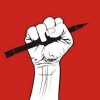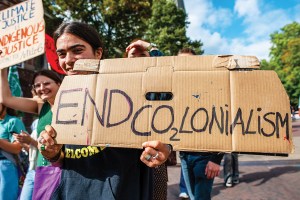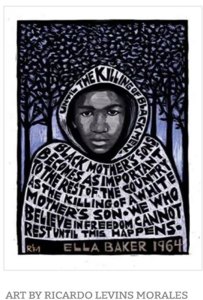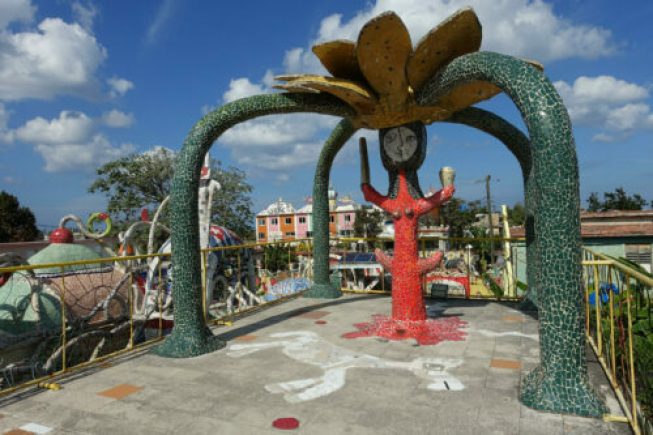
“Santa Barbara” by artist José Fuster of the Jaimanitas Project. Photo: Carol Walker.
Cuba: Close But No Cigar
By Lucia Wilkes Smith Vol. 41 No. 1 Spring I 2023
Women Against Military Madness Newsletter
Travel with Witness For Peace (WFP), December 2-11, 2022, was nearly perfect. The places where I stayed (mainly the Martin Luther King Center in Havana) were comfortable, except for the glaring absence of toilet paper, seats on the toilets, soap, or warm water in the shower. My first visit to a restroom in Cuba revealed effects of the 60-year-old U.S. embargo, which Cubans call The Blockade and understand to be immoral. Throughout the nation of just over 11 million people,basic necessities – toilet paper, housepaint, and supplies to repair and replace outdated fixtures and pipes – are impossible to locate.
WFP delegation members were free to walk, take taxis, and talk with Cuban individuals. Scheduled educational programs included presentations at medical care centers, a school for children with disabilities, and an organic farm.The work of every one of the sites we visited is negatively impacted by the U.S.-imposed embargo, which even imposes sanctions on other countries attempting trade with Cuba. The embargo and sanctions explain the presence of old, polluting Chevrolets and DeSotos manufactured in the U.S. during the 1950s and still running on Cuban roadways.
 According to Smithsonian Magazine, “by the late 1950s, U.S. financial interests included 90 percent of Cuban mines, 80 percent of its public utilities, 50 percent of its railways, 40 percent of its sugar production . . . “*The Cuban revolution ousted the dictator Batista in 1959, along with tourism money-makers that looped in the Mafia, gambling, and prostitution. The Cuban revolutionary system nationalized many corporations and some privately held property.
According to Smithsonian Magazine, “by the late 1950s, U.S. financial interests included 90 percent of Cuban mines, 80 percent of its public utilities, 50 percent of its railways, 40 percent of its sugar production . . . “*The Cuban revolution ousted the dictator Batista in 1959, along with tourism money-makers that looped in the Mafia, gambling, and prostitution. The Cuban revolutionary system nationalized many corporations and some privately held property.
Vintage advertising image featuring a cigar for which Cuba was renowned.
I intended to buy souvenirs in Cuba to support that economy. My son requested Cuban cigars. I discovered the U.S. makes it illegal for us to spend money in businesses operated by the Cuban government, and I saw no cigars in the little privately owned shops I visited. When I said I wanted to bring home Cuban cigars, the WFP staff person warned, “Do not risk it! The U.S. levies a fine of $10,000 if you are caught taking Cuban cigars through customs.” Whoa! I bought my son a refrigerator magnet replica of a Cuban cigar.
Though the Cuban government provides free education for students from preschool through graduate school, evidence of the blockade shows up in the details. We learned while visiting a music school that it’s usually impossible to provide strings and rosin for violins or reeds for oboes because of the blockade.
Our delegation visited a tuition-free medical school where hundreds of students from many countries are educated. Following their medical program, the new physicians return to practice in their countries of origin. We met several students, including three from the U.S.
Cuban people have excellent preventive healthcare and medical care provided without fees. According to the World Health Organization, Cuba has the highest doctor-to-population ratio in the world and has sent thousands of doctors to more than 40 countries in need. In Havana,we met a primary care physician who described the care delivered at her clinic for about 890 people in that neighborhood. The doctor often visits people at home so she becomes aware of their living conditions. She and the clinic nurse even live within the communitythey serve.
Clearly, the original embargo goal of causing personal misery was to provoke the Cuban population to rise up, overthrow its government, and reinstitute U.S.-style capitalism. Well, that’s not going to happen.Though life is difficult for Cubans, most seemed determined to make their people-centered system work for themselves and their neighbors. I saw a certain resilience and beauty in that.
Lucia Wilkes Smith is a long-time participant in peace and justice activities. She serves on the WAMM Board and WAMM Middle East Committee. She is active in the MN-BDS movement and Pipeline Blues Vigil to Stop Line 3.
*Geiling, Natasha. History. “Before the Revolution,” Smithsonian Magazine, July 31, 2007.tinyurl.com/2p8465fh
A donation to Rise Up Times of any amount makes it possible to continue to bring you thoughtful analyses and reflections on current issues as well as events, stories, and opportunities for action. Donate now — just click here to donate through PayPal. (You do not need to be a Pay Pal member.)
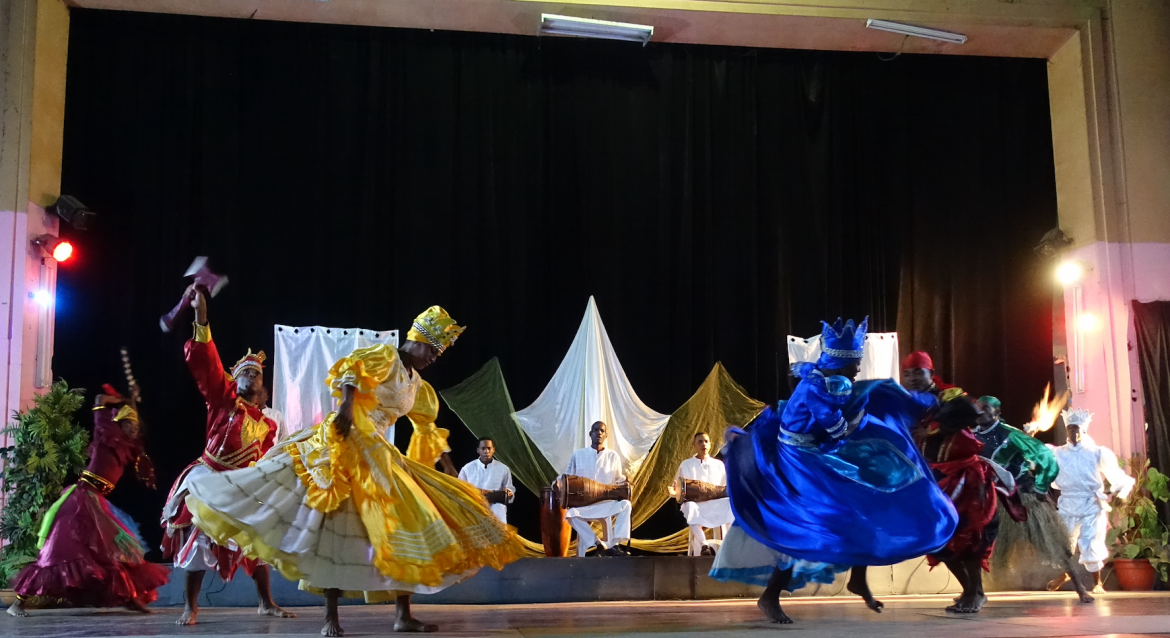
Dance performance at the Alba Theater by Okan-Tomi, a dance company that explores and reworks Afro-Cuban dances and music. Photo by Carol Walker.
Cuban Values
By Carol Walker Vol. 41 No. 1 Spring I 2023
Women Against Military Madness Newsletter
The first week in January of 2023, an Arts and Culture educational tour organized by Proximity Cuba partnered with Veterans for Peace for a visit to Cuba. The twelve people from Hawaii, California, Washington, New Mexico, New York, Rhode Island, and Minnesota referred to themselves as the “Amor y Solidaridad” delegation. We visited the Museum of Fine Arts in Havana along with visits to many home studios including ceramist and painter José Fuster. We were treated to Afro-Cuban music and dance and experienced the rich and diverse Cuban culture.
Another visit our group made was to the Literacy Campaign Museum. The Year of Literacy was 1961. Thousands of young people (many teenagers) went throughout Cuba teaching reading and writing. In less than a year, Cuba eradicated illiteracy. In the words of one of the young volunteer teachers:
The literacy campaign taught us how to share, how to give without expecting anything in return, because in the literacy campaign, nobody went to be paid; nobody was given anything. We went to share what we knew, to give our good intentions, to work for the satisfaction of people learning to read and write. That gave us the values with which we’ve lived our lives ever since. And for those of us who were women, it liberated us, because our entire generation of women gained a completely different view of life.
Today, education is free in Cuba through the university level. The Latin American School of Medicine (ELAM) in Cuba is the world’s largest medical school. Since its founding in 1999, it has graduated tens of thousands, with full scholarships, including students from the United States.
Our group visited Las Terrazas, a biosphere reserve and national park. In 1968 the region was an eroded mountain chain where a few families lived in extreme poverty. To change this situation, in eight years, 20 km of roads and 1,370 terraces were constructed,and seven million hardwood trees were planted. The community was built in complete harmony with the surrounding environment. Tourism was developed to complement its sustainability.
The delegation also traveled to the western province of Pinar del Rio where Hurricane Ian hit in September of 2022. We met with officials and workers and saw first hand the new homes being built (free of charge) for people who had lost everything. We were able to deliver a small amount of humanitarian aid. In 2005, after Hurricane Katrina, Cuba offered to send 1,586 doctors and tons of medical supplies, but this was rejected by the U.S. State Department. In contrast, the U.S. has not lifted even a temporary suspension of the blockade to allow Cuba to rebuild after Hurricane Ian ravished its shores.
The Cuban Institute of Friendship with the People (ICAP) held a press conference about the Golden Rule, a project of Veterans for Peace. The project was widely reported in Cuban media, including TV stations.The Golden Rule antinuclear sailboat had sailed from Key West, Florida to Havana, Cuba, calling for an end to the U.S. blockade. According to Gerry Condon, crew member and former VFP national president, “the U.S. blockade is an act of terrorism against Cuba. This is an illegal, immoral action and has been condemned by most of the world.”
In fact, on November 3, 2022, the U.N. General Assembly voted overwhelmingly to condemn the American economic embargo of Cuba for the 30th consecutive year: 185 countries voted to support condemnation with only the United States and Israel opposing it, and Brazil and Ukraine abstaining.
Carol Walker is a member the Minnesota Peace Action Coalition. She serves on the WAMM Board,and the WAMM End War Committee, and is a long-time regular participant in antiwar vigils, among other peace and justice activities.
ACTION:
Demand an end to the 60-year U.S. blockade of Cuba. Protest of the inclusion of Cuba on the U.S. State Sponsor of Terrorism list.
Call or message senators and the U.S. President:
President Joe Biden: 202-456-1111
Minnesota Senator Klobuchar: (202) 224-3244
Minnesota Senator Tina Smith: (202) 224-5641
Congressional switchboard for any state: (202) 224-3121 to connect to your senators’ offices.
Join the Cuba car caravan:
Car caravans are usually scheduled for the last Sunday of the month. Check the Solidarity Committee of the Americas (SCOTA) Facebook page or the WAMM calendar to confirm. Sponsored by WAMM’s Solidarity Committee on the Americas (#SCOTA_MN) and the Minnesota Cuba Committee.
Independent media is essential in these Rise Up Times. Your support makes Rise Up Times, Media for Justice and Peace possible. Please donate today.
